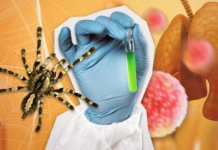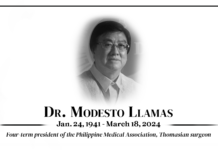A NEW look at transgenders and women in jail, public health research, and innovations in scientific fields were the subjects of some of the University’s best scientific theses for the Academic Year 2015 to 2016.
The researches resulted in new modules and observations in their respective fields, as well as the discovery of two new species of plants.
Assessing discrimination
The Department of Psychology feted Anna Alcantara, Ariana Reyes, Patricia Yulo and Christian Santos, who studied the link between internalized stigma and self-concept.
According to the American Psychological Association (APA), a “transgender” is a person whose gender identity or gender expression does not match with what is usually associated with their birth sex.
“What is between your legs is your sex assigned at birth or your biological sex. What is between your ears is your gender identity. These two are very different,” Prof. Eric Reyes said.
Alcantara and her peers explained that because there is no concrete definition of a transgender, the country has no complete tally of transgender people.
Unfortunately, discrimination is common toward transgender people. Most of the research’s 114 participants said that discrimination against them because of their gender identity makes them “confused and unstable.”
“If they feel that there are a lot of people judging and discriminating them (transgenders) in their community, there are tendencies of confusion within themselves and who they really are,” Alcantara said.
Alcantara and her peers hoped their study, which was also published in the June issue of this year’s North American Journal of Psychology, would help other experts compare and analyze existing cultural trends towards transgenders.
‘Successful aging’
Nursing students Carl Lozano, Heizel Lucas, and Gelli Lumawag bagged the college’s best qualitative thesis for developing a model of “successful aging” among old women by observing them in jail.
Lozano’s “The Road to Success Model” originated from the idea of finding out the “process” of reforming an inmate. It emphasizes on her “struggle,” “remotivation,” “reformation,” “reintegration” and “sustaining” her return to society.
The study suggested that prisons should “individualize” and must provide holistic care, and not just physical health, to inmates to help intergrate them in society.
On managing health
The Occupational Therapy’s best poster sought to reinforce the Philippine’s local pain management program research.
The study by Chrystelle Avanzado, Darlene Estrada, Precious Luis, Macy Peralta and Gerard Recio, focused on biological factors such as pain intensity, and psychological factors such as anxiety, depression and stress, on the occupational performance of Filipino chronic pain patients.
It concluded that pain management in the country would have to be improved to be at par with other countries.
“If you want to address pain [in the Philippines], you have to go to different professions (such as doctors, physical therapist and psychologist). When it comes to other countries [with pain management programs], they only go to one place,” Recio said.
According to the World Health Organization, correct diagnosis and proper treatment of pain (coined “pain management”) is an important public health concern and would have to be properly addressed. It advised that all countries should develop guidelines for patients with different kinds of diseases, depending on factors such as sex and age.
Health workers
Nursing student Tristan Santos claimed the award for the college’s Best Quantitative Thesis Award with a module that could help Barangay Health Workers assess the condition of pregnant women.
Having witnessed the delivery of a newborn child for the first time, Santos wanted his study to “equip” Barangay Health Workers with the right knowledge to aid pregnant women suffering from complications.
“In the face of vast demands [especially in provinces where there has been a relative shortage] of doctors and nurses, Barangay Health Workers filled the gap—which is why we need to equip them,” Santos said in an interview.
The study came up with a simplified book-based module that can help assess the condition of pregnant women according to urgency.
Color-coded patterns indicated that conditions labeled with green are tolerable at home, yellow conditions are circumstances where pregnant women have to be checked in the health center, while red signals the need to proceed to a hospital.
The module also includes step-by-step procedures in Filipino, as well as instructions health workers could ask assistance for, as well as abnormalities pregnant women could experience.
Innovations in biology, translation
College of Science students Beatrice Del Rosario, Mariane Agoncillo and Emil Cano bagged the Best Thesis Award in the Biology department for their study on the molecular phylogeny and barcoding of the Philippine Vanguerieae (Rubiaceae) and an antimicrobial study on Psydraxpuberula.
The research, which resulted in the discovery of two new species and a combination, was mentored by Grecebio Alejandro, who is also a pioneer of DNA barcoding in the country.
The study initially tried to determine the true phylogenic positions of 17 plants that Del Rosario and her peers collected under the genus Canthium. However, molecular and morphological observations led to the discovery of two new Pyrostia species (P. luzonensis and P. cuspidata) and a new combination (P. elliptica).
The study concluded that Pysdrax puberula has antimicrobial properties and is a promising source of bioactive compounds that can eliminate bacteria.
The last phase of the research involved using unique markers in the DNA of each plant to establish its “barcode.”
Alejandro and his peers recently launched the country’s first plant DNA database early this year, which aims to catalog and index Philippine medicinal plants.
Translation
Sports Science students Lennin Badua, John Dolor, Jo Punsalan, Jose Mendoza and Paul Ravarra sought to evaluate current Filipino translation practices.
Their study’s poster, which bagged the Best Poster Award, focused on the translation and evaluation of an English food practices questionnaire into Filipino, to be used by areas in rural communities.
“Our goal is to translate and validate the questionnaire to be used in a Filipino setting especially in rural areas where some do not fully comprehend English,” Ravarra said in an interview.
The study translated and evaluated a test questionnaire from English to Filipino. The researchers translated the questionnaire back into English to evaluate the accuracy of the translation.














